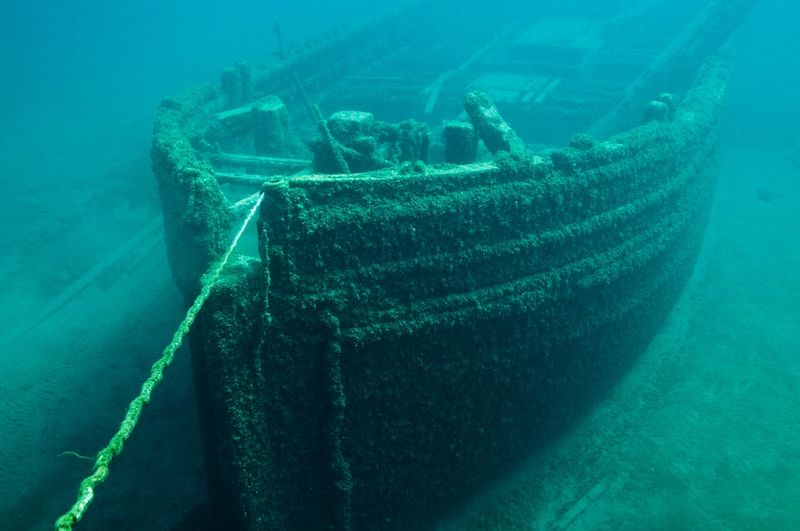James Cameron Calls Diving to the Titanic Wreck a “Mature Art”
Titanic Director Reflects on Submarine Dive
James Cameron, the acclaimed director of the film Titanic, has spoken out about the recent loss of a submarine that was exploring the Titanic wreck. In an interview with ABC News, Cameron, who himself has spent extensive time exploring the Titanic via submarine dives, describes deep submergence diving as a “mature art.” He implies that the submarine used in this particular expedition was not adequately equipped for the task.
Cameron emphasizes his own experience and expertise in designing a submarine that could dive to the deepest parts of the ocean. He reminds viewers that he has personally gone three times deeper than the Titanic itself. He asserts that he understands the engineering challenges involved in building a vehicle for deep-sea exploration.
Warnings Unheeded
Cameron draws parallels between the recent loss of the Titanic sub and the original Titanic disaster. He notes that the captain of the Titanic was repeatedly warned about ice ahead of the ship but chose to ignore these warnings and continued at full speed into an ice field on a moonless night. Cameron finds it astonishing that a similar lack of caution occurred at the same site.
While there is some debate about the extent to which the Titanic‘s Captain Smith ignored ice warnings, Cameron’s comparison serves to highlight the potential dangers of disregarding warnings in both instances. By discussing the Titanic disaster and the recent loss of the sub in this way, Cameron prompts us to consider the lessons that can be learned from history and the price of ignoring precautions.
Lessons from the Titanic
The story of the Titanic has captivated the world for over a century, and its lessons continue to hold relevance today. One of the main themes of the Titanic tragedy is the fallibility of human arrogance. The belief that the Titanic was unsinkable led to a sense of invincibility that ultimately contributed to the ship’s demise.
The recent loss of the Titanic sub serves as a reminder that no matter how advanced our technology becomes, we must always approach exploration and adventure with caution and respect for the natural environment. It is crucial to prioritize safety and adhere to established guidelines and protocols.
Bringing Attention to Responsible Exploration
With his remarks, James Cameron raises awareness about the importance of responsible exploration and the need for proper evaluation and preparation in any venture, especially those involving great risks. Cameron’s own successful dives to the Titanic wreck exemplify the proper approach to deep-sea exploration, where meticulous planning and engineering expertise played key roles in ensuring the success and safety of the mission.
Cameron’s comments should serve as a wakeup call to other experts and enthusiasts in the field of deep-sea exploration. As exciting as underwater expeditions may be, it is imperative to prioritize safety and professionalism to avoid unnecessary risks and potential disasters.
The Legacy of the Titanic
The tragedy of the Titanic has left an indelible mark on history and popular culture. From books to movies, the story continues to captivate audiences around the world. However, it is essential to reflect on the deeper lessons that can be learned from this event.
The Titanic serves as a cautionary tale, reminding us of the consequences that can arise from hubris, recklessness, and a failure to heed warnings. It serves as a reminder that even the mightiest can fall, and that we should never become complacent or overconfident in the face of nature’s power.
A Call for Responsible Exploration
As technology advances and exploration ventures into new frontiers, it is crucial that we approach these endeavors with a sense of responsibility and mindfulness. Whether it be deep-sea expeditions or space exploration, the potential for disaster is ever-present.
James Cameron’s expertise and experience in deep-sea exploration provide valuable insight into the importance of responsible exploration. His remarks should serve as a reminder to prioritize safety, meticulous planning, and respect for the environment in all future exploration efforts.
The loss of the Titanic sub may serve as a wake-up call for the industry, prompting a reevaluation of protocols and safety measures. By learning from past mistakes and taking proactive steps to prevent future accidents, we can ensure that exploration continues to inspire awe and wonder while minimizing risks to human life and the environment.
In conclusion, James Cameron’s reflections on the recent loss of the Titanic sub highlight the importance of responsible exploration, proper preparation, and a commitment to safety. The Titanic remains a potent symbol of the consequences of arrogance and the need for humility in the face of nature’s power. As we continue to push the boundaries of exploration, we must do so with caution, respect, and a mindful awareness of the lessons that history has taught us.

<< photo by NOAA >>
The image is for illustrative purposes only and does not depict the actual situation.
You might want to read !
- Tom Cruise: Embracing the Mystique of Aviators, Day and Night
- “Exploring the Haunting Connection: James Cameron’s Intuition and the Titanic Tragedy”
- Exploring the Marvelous Praise: Robert Downey Jr. Applauds Cillian Murphy’s Oppenheimer Performance
- Lost at Sea: The Mysterious Disappearance of Stockton Rush ’84 in the Titan Submersible
- From Vision to Tragedy: The Untold Story of Titan Submersible and Stockton Rush
- SNP Pioneer Winnie Ewing Passes Away at 93: A Legacy Explored
- The Behind-the-Scenes Rift between Arnold Schwarzenegger and James Cameron
- The Significance of Movie Catchphrases: Arnold Schwarzenegger and James Cameron’s Dispute Over “I’ll be back”
- Lost at Sea: The Tragic Tale of Glasgow Student Suleman Dawood Aboard the Titanic
- Stricken Titanic Sub: A Strathclyde University Student’s Unlikely Adventure
- “And Just Like That Season Two: A Familiar Nod to the Iconic Sex and the City”




